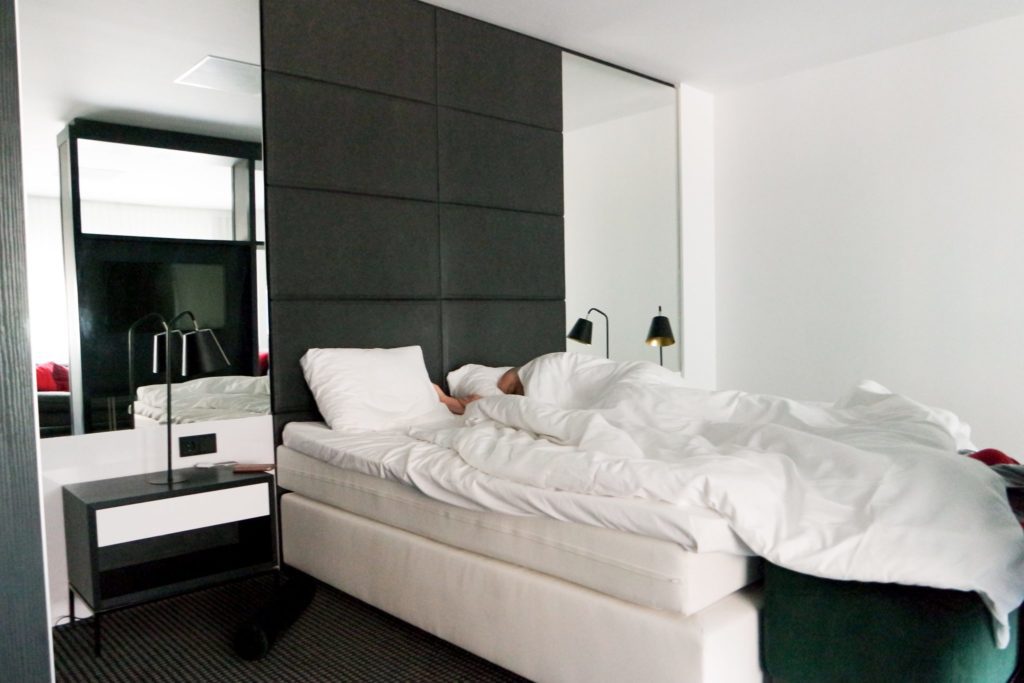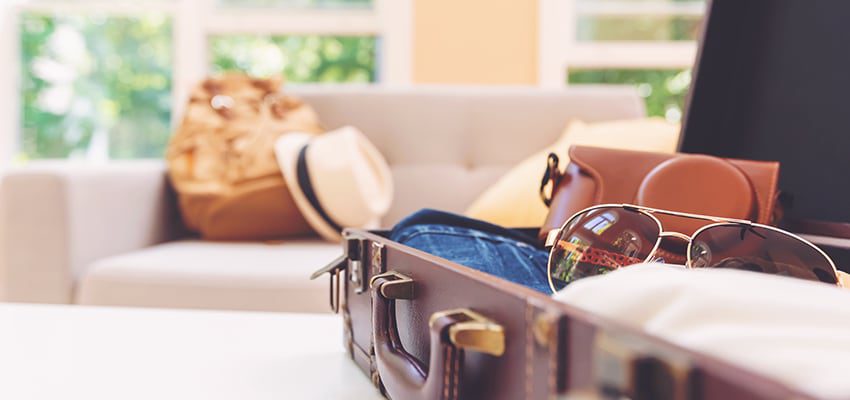Hotels are meant to be comfortable homes away from home during travel, but sleep in a hotel can feel elusive.
You may know well the stress of tossing and turning in an unfamiliar bed. Maybe you find yourself staring at the alarm clock, wishing you could fall asleep but feeling unable to do so. Your hotel-induced insomnia may be compounded by worrying about being alert for the presentation or early-morning meeting you have to attend the next day.
Sleep is essential for good health. It helps rejuvenate the brain and body, which is especially important when you’re traveling. Getting a good night’s sleep on a regular basis is also important for promoting long-term health. So, if you find yourself traveling regularly, you have even more incentive to crack the code of sleeping well while away from home.
How can you get a good night’s sleep when staying in an unfamiliar bed or room? We’ll discuss tips to achieve a good night’s sleep even when spending the night at a hotel.
Why Can't I Sleep in Hotel Rooms?
Everything from room temperature to bedding to jet lag can keep you from sleeping well in a hotel.
It’s difficult to find any sleep environment that’s as comfortable or familiar as home. The hotel thermostat might be set higher or lower than you prefer. Maybe the mattress isn’t to your liking, or the comforter is too heavy. Add in the potential to hear your neighbors talking or kids running in the hall, and it’s no wonder sleep is hard to find.
If you’ve traveled by plane across time zones, you may also experience jet lag. Jet lag is a temporary sleep issue that happens when a person travels across more than three time zones. Essentially, your body’s internal clock doesn’t match up with where you are. Symptoms of jet lag include sleepiness during the day, general fatigue, and difficulty sleeping at night.
Many people also have trouble sleeping in hotel rooms because the room is simply unfamiliar to them. Even if you know rationally that a hotel room is safe, you may feel on guard in a new environment and unable to relax enough to sleep well.
The “First Night Effect”
The “first night effect” is a phenomenon that occurs when someone sleeps in an unfamiliar room for the first time. It’s the inability to fall asleep and stay asleep while sleeping in a new place.
There’s evidence to suggest that there’s actually a survival mechanism at play here. Most people have trouble sleeping the first night in an unfamiliar room because half their brain is remaining vigilant while the other half sleeps more deeply.
Researchers hypothesize that the vigilant part of the brain is able to quickly induce wakefulness when it receives an unusual signal from the environment during sleep.
In other words, when sleeping in an unfamiliar room like a hotel room, a part of the brain constantly monitors the environment to detect any potential danger in the room. First night effect is temporary and usually resolves by the second night of sleep.
Tips for Sleeping Better in Hotels
There are various methods you can use to sleep better when staying at a hotel in an unfamiliar room, and it mostly boils down to practicing good sleep hygiene. Incorporating all or some of these tips can improve your quality of sleep in general, whether you’re sleeping in your own bed or in a hotel.
- Avoid Noisy Areas: When making a hotel reservation, request a room that is on an upper floor and far away from the elevators. Doing so can keep you away from highly trafficked areas and the noise that’s often found there.
- Ensure Darkness and Quiet: If necessary, consider sleeping with ear plugs or a sleep mask to create a dark, quiet environment. Studies show that the use of ear plugs and sleep masks while sleeping can even increase natural melatonin levels, making it easier to fall asleep.
- Try White Noise: Research shows that white noise can help mask environmental sounds that disrupt sleep. Using a white noise app on your smartphone may be useful to block out environmental sounds while sleeping during your hotel stay.
- Eat Strategically: If possible, avoid eating heavy meals late in the day. Eating too much food too close to bedtime can lead to sleeping difficulties. If you need to eat or drink something before bed, consider a light snack that includes foods that may help with sleep such as certain types of cherries, milk, and fish.
- Avoid Blue Light: Use electronics that emit blue light sparingly before bed. The blue light that comes from electronic devices interferes with melatonin production that naturally occurs in the body. As a result, it makes it more difficult to fall asleep.
- Do Not Disturb: It is not just the blue light from electronics that can interfere with sleep. Tablets and smartphones that constantly ring and beep throughout the night can make it more difficult to sleep anywhere, let alone a hotel. Silence your phone at bedtime to avoid notifications that can disrupt your sleep.
- Turn Down the Thermostat: Make sure the hotel room is set at a comfortable temperature, which is around 65° to 68° for most people. Sleeping in a room that’s too warm contributes to wakefulness. That’s because your body temperature is meant to naturally decrease as you fall asleep.
- Avoid Caffeine Late in the Day: Avoid drinking caffeine too late in the day. Caffeine is a stimulant, meaning it makes you more awake and alert, and it stays in your system for several hours. That’s great when you want to get going in the morning but not what you need when you’re settling down to sleep.
- Avoid Nicotine at Night: Nicotine, like caffeine, is a stimulant. For this reason, it’s a good idea to avoid nicotine four to six hours before you go to bed.
- Reduce Alcohol Before Bed: You may enjoy having a drink or two when staying at a hotel to help you relax. Just try to avoid drinking too close to bedtime. That’s because alcohol affects how your sleep is organized and the amount of deep sleep you’re able to get.
- Get Moving: Try to get some exercise during the day. Regular exercise can help you sleep better at night. However, it’s best to avoid exercise during the few hours leading up to bedtime.
- Take Care With Naps: If you find yourself struggling to fall asleep, try not to take naps during the day as they can interfere with your ability to sleep at night. If you do find it necessary to take a nap, make sure you’re napping for about 20 minutes or so and before 3 p.m.
- Try a Hot Bath: Take a hot bath one or two hours before you go to bed. Not only is it relaxing, it will raise your body temperature, and you’ll start to feel sleepy when you get out of the bath and your body temperature drops again.
- Check the Alarm Clock: It’s possible that a previous guest in your hotel room may have left an early alarm set on the hotel alarm clock. Inspect the clock to see if this is the case, and make sure the alarm is off or set to your desired wake time.
Sleeping Well in a Hotel Is Possible
Sleep is an important part of staying healthy. It helps the brain and body recover and facilitates good decision making skills. A good night’s sleep boosts mental health, helping people feel more optimistic about their lives.
People who are well-rested tend to get along better with others at work, school, or in social settings. People who get adequate sleep also have a higher chance of avoiding chronic diseases.
Even though sleeping well in a hotel can be challenging, it is not an impossible feat. Taking the proper steps to practice good sleep habits can help.
Whether it’s choosing a hotel room far from the ground floor or elevators, turning off electronic devices before going to bed, sleeping with white noise, wearing an eye mask while sleeping, or avoiding heavy meals before bed, these simple tips can make it more likely that you, too, can enjoy a good night’s sleep in a hotel.
References
Ask the Sleep Doctor
Have questions about sleep? Submit them here! We use your questions to help us decide topics for articles, videos, and newsletters. We try to answer as many questions as possible. You can also send us an email. Please note, we cannot provide specific medical advice, and always recommend you contact your doctor for any medical matters.


